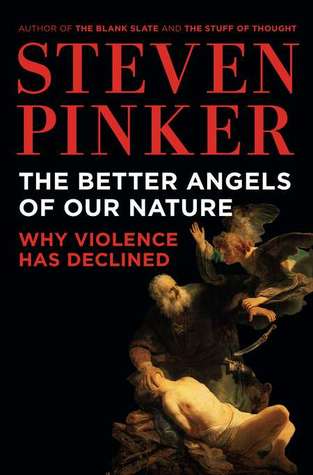Capitalist Peace
Such findings have led some political scientists to entertain a heretical idea called the Capitalist Peace.243 The word liberal in Liberal Peace refers both to the political openness of democracy and to the economic openness of capitalism, and according to the Capitalist Peace heresy, it’s the economic openness that does most of the pacifying. In arguments that are sure to leave leftists speechless, advocates claim that many of Kant’s arguments about democracy apply just as well to capitalism. Capitalism pertains to an economy that runs by voluntary contracts between citizens rather than government command and control, and that principle can bring some of the same advantages that Kant adduced for democratic republics. The ethic of voluntary negotiation within a country (like the ethic of law-governed transfer of power) is naturally externalized to its relationships with other countries. The transparency and intelligibility of a country with a free market economy can reassure its neighbors that it is not going on a war footing, which can defuse a Hobbesian trap and cramp a leader’s freedom to engage in risky bluffing and brinkmanship. And whether or not a leader’s power is constrained by the ballot box, in a market economy it is constrained by stakeholders who control the means of production and who might oppose a disruption of international trade that’s bad for business. These constraints put a brake on a leader’s personal ambition for glory, grandeur, and cosmic justice and on his temptation to respond to a provocation with a reckless escalation.
Democracies tend to be capitalist and vice versa, but the correlation is imperfect: China, for example, is capitalist but autocratic, and India is democratic but until recently was heavily socialist. Several political scientists have exploited this slippage and have pitted democracy and capitalism against each other in analyses of datasets of militarized disputes or other international crises. Like Russett and Oneal, they all find a clear pacifying effect of capitalist variables such as international trade and openness to the global economy. But some of them disagree with the duo about whether democracy also makes a contribution to peace, once its correlation with capitalism is statistically removed.244 So while the relative contributions of political and economic liberalism are currently mired in regression wonkery, the overarching theory of the Liberal Peace is on solid ground.
The very idea of a Capitalist Peace is a shock to those who remember when capitalists were considered “merchants of death” and “masters of war.” The irony was not lost on the eminent peace researcher Nils Petter Gleditsch, who ended his 2008 presidential address to the International Studies Association with an updating of the 1960s peace slogan: “Make money, not war.”
Notes:
Folksonomies: capitalism peace
Taxonomies:
/society/unrest and war (0.288393)
/law, govt and politics/government (0.252203)
/society (0.230551)
Keywords:
Capitalist Peace (0.943631 (positive:0.144814)), economic openness (0.824477 (positive:0.627404)), Capitalist Peace.243 (0.813775 (positive:0.558024)), Liberal Peace (0.767415 (positive:0.439947)), market economy (0.766537 (negative:-0.720708)), free market economy (0.761752 (neutral:0.000000)), political scientists (0.750591 (negative:-0.199106)), capitalist variables (0.736902 (positive:0.561148)), peace researcher Nils (0.735090 (neutral:0.000000)), international trade (0.721841 (negative:-0.159560)), political openness (0.715239 (positive:0.558024)), International Studies Association (0.709969 (positive:0.284959)), clear pacifying effect (0.691932 (positive:0.561148)), Capitalism pertains (0.686335 (neutral:0.000000)), Peace Such findings (0.627429 (positive:0.558024)), word liberal (0.623846 (positive:0.558024)), Kant’s arguments (0.620393 (neutral:0.000000)), heretical idea (0.613202 (positive:0.558024)), democratic republics (0.600535 (neutral:0.000000)), peace slogan (0.596856 (positive:0.284959)), global economy (0.594344 (positive:0.561148)), reckless escalation (0.592760 (neutral:0.000000)), risky bluffing (0.590043 (negative:-0.653828)), war footing (0.588046 (neutral:0.000000)), law-governed transfer (0.582984 (positive:0.644205)), personal ambition (0.582894 (positive:0.369513)), voluntary negotiation (0.582521 (positive:0.630474)), ballot box (0.581864 (negative:-0.463682)), voluntary contracts (0.580925 (neutral:0.000000)), government command (0.579998 (neutral:0.000000))
Entities:
Kant:Person (0.853659 (neutral:0.000000)), global economy:FieldTerminology (0.644898 (positive:0.561148)), Nils Petter Gleditsch:Person (0.636099 (neutral:0.000000)), International Studies Association:Organization (0.586462 (positive:0.284959)), free market:FieldTerminology (0.540777 (neutral:0.000000)), Russett:Person (0.536403 (positive:0.291796)), researcher:JobTitle (0.518337 (neutral:0.000000)), China:Country (0.513228 (neutral:0.000000)), India:Country (0.493264 (neutral:0.000000)), Oneal:Person (0.459312 (positive:0.291796))
Concepts:
Capitalism (0.988508): dbpedia | freebase | opencyc
Free market (0.950606): website | dbpedia | freebase | yago
Economic liberalism (0.671441): dbpedia | freebase | yago
Market economy (0.643981): dbpedia | freebase
Socialism (0.612252): dbpedia | freebase | opencyc
Communism (0.594722): dbpedia | freebase | opencyc
Social democracy (0.591904): dbpedia | freebase
Fascism (0.581499): dbpedia | freebase | opencyc





